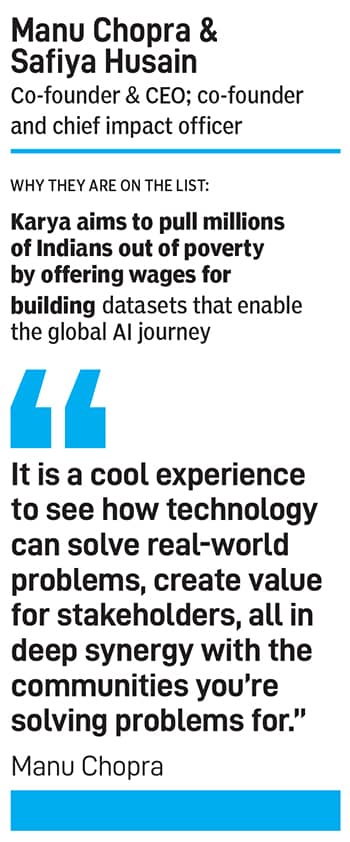Chopra, a Stanford graduate, had returned to India to work with Microsoft before starting Karya in 2021 along with Safiya Husain and Vivek Seshadri. “I believe in an individual’s right to take ownership of their financial future and sustainability through fairly compensated work," Chopra says. “We currently facilitate this through engaging workers in tasks related to speech dataset generation and image annotation, with a plan to expand to higher-skilled, lucrative tasks. With our user-friendly application and work-from-anywhere model, anyone who owns a smartphone can be a Karya worker."
Before he went on to set up Karya, Chopra had run the Chopra Foundation, which worked in over 1,000 villages across India. In high school, he had also invented and subsequently patented an anti-molestation device for women. However, the focus on improving the lives of rural communities finds its roots in the time he spent at Stanford, where he studied computer science, and set up the university’s first group that focussed on the intersection of computer science and social good. At Stanford, Chopra was taught by world-renowned scientists Andrew Ng and Fei Fei Li, which prompted him to explore the world of AI.
“To me, it is such a cool experience to see how technology can solve real problems, create value for stakeholders, all in deep synergy with the communities you’re solving problems for," Chopra says. “It’s a transformative experience." That’s also why four days after he finished college, Chopra was in Bengaluru to work with Microsoft Research. At Microsoft, he met Seshadri, who would become Chopra’s co-founder at Karya later.
View the full list here
“We wanted to see how AI could be a tool for good in India," Chopra says. “Along with that, we wanted to build the highest quality of dataset and be the gold standard for datasets that are as diverse as possible." It had helped that smartphone penetration in the country had been on an upswing, with the internet becoming significantly cheaper, and with 80 percent of rural households having access to a smartphone, the opportunity was immense to capitalise on.
“If you want to build inclusive AI, you have to employ the communities," Chopra says. “The reason AI is worse off in Tamil than it is in English is that fewer Tamil-speaking people have trained AI models. And that’s what we need to change."
Today, Karya works with over 100,000 people in every district in every state of the country, paying them at least $5 an hour. “The work starts with reading out sentences in their mother tongue, building local language and speech datasets which we need to build AI models," Chopra says. “Then we upskill them to level two, where we show an image and ask them to talk about it. Level three is slightly more complicated because they’re doing subtitling, and AI models can learn from that, which pays $10 an hour."
Some of the more serious work even involves payment of $25 an hour. Karya’s clientele includes the likes of the Government of India, Google, Ola, Microsoft and Zoho, among others. For now, the company says it doesn’t need to raise funds because it breaks even on its projects.
“In a world that is racing towards AI advancement, Manu and Safiya remind us that the future of AI must be inclusive, ethical and human-centred," Kalika Bali, senior principal researcher at Microsoft Research India, tells Forbes India. “Through Karya, they’ve shown that it is possible to build cutting-edge technology while creating dignified digital livelihoods, through responsible data practices and linguistic inclusion. Manu’s bold vision and Safiya’s grounded execution complement each other to drive a mission that affirms that cutting-edge innovation can—and must—uplift those at the margins."

